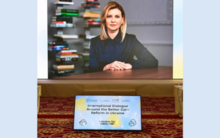
This page contains documents and other resources related to children's care in Europe. Browse resources by region, country, or category.
This page contains documents and other resources related to children's care in Europe. Browse resources by region, country, or category.
Displaying 71 - 80 of 1752
This is a tool that ensures all components of child protective care: health, adequate nutrition, care, safety and early education, through the intersectoral collaboration between the Ministry of Labor and Social Protection, the Ministry of Health, the Ministry of Education and Research and local public administration authorities.
On 26 April 2024 the International Dialogue on Better Care Reform was held in Kyiv as part of the International Summit of Ministers of Social Policy. The Government of Ukraine is currently working on establishing an International Advisory Group to serve as a platform for collaboration, guidance, and ongoing support to strengthen its child care and protection systems.

This UNICEF paper summarises evidence on the current use and impact of boarding schools in the Europe and Central Asia (ECA) region and draws on wider international evidence. It proposes a typology of boarding schools and considers the drivers for their use, as well as the concerns and challenges related to that use for vulnerable children.
Research highlights that residential care experienced children and young people in Scotland have poorer educational outcomes than their peers within the wider population. Despite experiencing adversity, attachment, separation and loss, school attainment data on leaving care only reflects part of the educational journey. This paper aims to address a gap in contemporary literature that is of benefit to practitioners, academics and policymakers.
This study examines the factors which drive the decision to provide child protection and welfare services in Ireland using social work case files and multivariable analysis.
This study demonstrates the need for participatory recordkeeping to promote the right of children and young people placed in Swedish residential care homes to record-making, to facilitate access to a complete record of their placements. It is further through record-making that the experiences of the placed individuals can be used to inform practice and policymaking.
This article provides an analysis of key policy and regulatory documents preceding or accompanying outsourcing policies in England (e.g., policy document relating to the 2012 and 2022 Health and Social Care Acts and the 2014 Care Act), and peer reviewed research on the impact of outsourcing within the NHS, adult's social care, and children's social care.
The current study examined irritability in 107 16-year-olds with a history of institutional care from a randomized controlled trial of foster care as an alternative to institutional care and 49 community comparison children.
In this article, the author adopts a broadly autoethnographic approach to reflect on how boys (now men in their late 40s and early 50s) brought up in the 1980s in a Scottish residential school recall being cared for.
This is a comment on the the report Pathways to Better Protection which gives promising indication that deinstitutionalisation policies are closing residential housing facilities and that increasingly, with the exception of children with disabilities, children are less likely to find themselves in residential care.